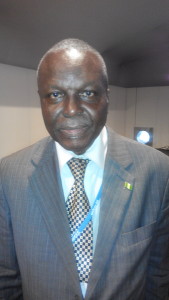We have decided to devote this piece to climate change and development issues. COP 21 is not a talk shop. Rather, it is a serious gathering of world leaders, government officials, negotiators, civil society and professionals. It is an important UNFCCC meeting that will take a vital decision that will affect humanity and global development.

Climate Change until recently was viewed largely as an environmental concern of little relevance to development. I had an experience of this sometime ago when I had a meeting with a notable member of a high profile professional body. I tried to explain how climate change affects all facets of human life and the need to address it through bringing a number of people across several professional sectors together to see how we can position Nigeria to play a key role in Africa. I was told that climate change is an instrument that the civil society is using to be relevant. I made efforts to convince the person but to no avail. However, the house of a close relative was damaged as a result of the flood and properties worth millions of Naira were lost and when it was said that it was caused by changes in the weather pattern, it was then that interest in climate change started.
Development considerations were also given less attention than technological and natural science approaches focussing on reducing greenhouse gas emissions. Unsustainable development is the underlining cause of climate change. Development pathways will determine the degree to which social systems are vulnerable to climate change.
Climate change has direct impacts on development with regard to climate sensitive activities such as poverty and education.
Climate change also affects distribution of facilities and likely to exacerbate inequalities due to the uneven distribution of damage as most communities tend to live on marginal lands and in areas prone to extreme weather events.
Development policies and practices must address climate change issues
There is need for us to start to focus the emerging issues on development and climate change. Our development planners must be trained and properly equipped with appropriate knowledge to acquire information, share it and incorporate the climate change issues into development plans. The communities must be engaged and their input reflected in the development agenda. For example, good adaptation presupposes development and we must ensure that climate change and development are linked through adaptation and mitigation.
In addressing climate change and the development, we must have a template to focus on land, agriculture, water, forests, justice, ethics, humanitarian issues, adaptation, planning, mitigation, finance and the private sector. These must be simple and easy to understand.
The road to COP 21 in Paris should assist us to let Nigerians understand the concept of low carbon resilient development, causes of climate change and impacts on the community. We must also ensure that we aim to generate a better understanding of the various linkages between development and climate change. In this regard, we need to look at issues beyond the negotiation tables that can serve as an opportunity to connect those working on these issues.
We also need to explore avenues for networking, business meetings and entrepreneurial development that can lead to job creation, employment generation and widen the knowledge base.
The vocabulary is changing in the development arena, we need to understand what the talk is about sustainable banking principles, solar water, solar houses, low carbon economy, biomass, fuel efficient stoves and others.
The challenge of COP 21 to us should include awareness raising, creation of resilient livelihoods, disaster risk impacts and measures to mitigate them.
We must integrate our communities, organise activities aimed to achieve multiple effects. It is suggested that we develop community ownership sense, sustain investment, create jobs, and create economic units capable to generate income. We need also to reach out to various organisations especially locally and globally who can assist us with finance, technology, training, and opportunity to share their experience on how we can address the challenges and tap into the opportunities arising from climate change.
We have a lot to do by working together as COP 21 like previous ones provide different platforms. Apart from the negotiation tables there are other areas that we can tap into including implementing the post COP 21 decisions. We must get the best for our country and as a nation we must start to put things in place to ensure active and effective participation in the processes.
We see the need to develop the capability of people who can be practitioners in the areas of environment, climate change and sustainable development. These practitioners can be useful in the integration of socio-economic measures that will create a better society.
By Prince Lekan Fadina (Executive Director, Centre for Investment, Sustainable Development, Management and Environment (CISME). (He is a member of the Nigeria Negotiation Team, Africa Group of Negotiators and member, AGN Finance Co-ordination Committee). Website: www.cismenigeria.com. Email: cismevision@gmail.com
